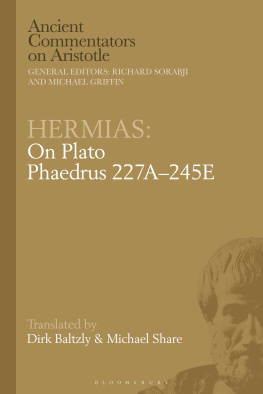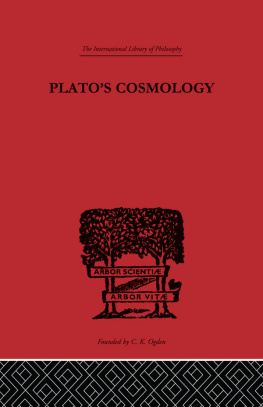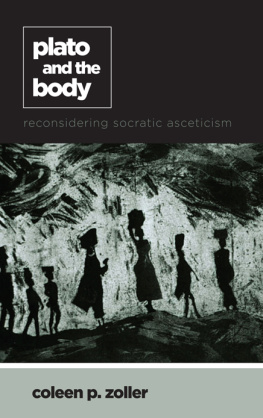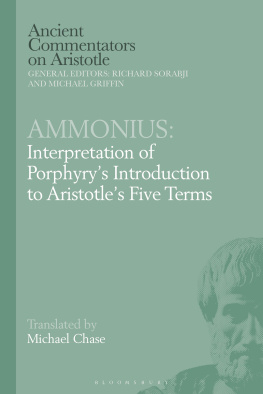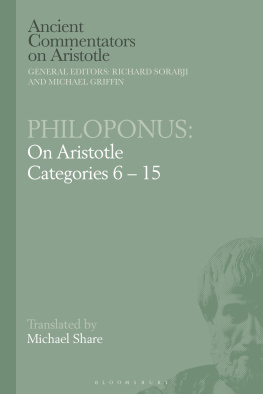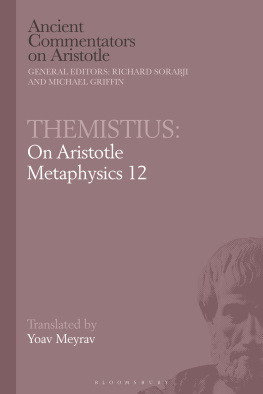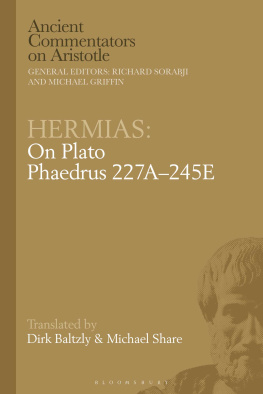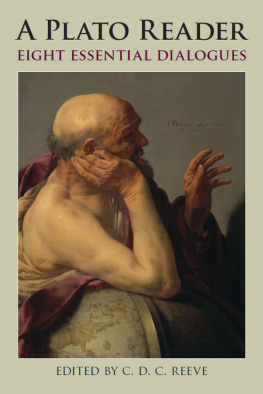
Hermias
On Plato
Phaedrus 227A245E
Ancient Commentators on Aristotle
GENERAL EDITORS: Richard Sorabji, Honorary Fellow, Wolfson College, University of Oxford, and Emeritus Professor, Kings College London, UK; and Michael Griffin, Assistant Professor, Departments of Philosophy and Classics, University of British Columbia, Canada.
This prestigious series translates the extant ancient Greek philosophical commentaries on Aristotle. Written mostly between 200 and 600 AD, the works represent the classroom teaching of the Aristotelian and Neoplatonic schools in a crucial period during which pagan and Christian thought were reacting to each other. The translation in each volume is accompanied by an introduction, comprehensive commentary notes, bibliography, glossary of translated terms and a subject index. Making these key philosophical works accessible to the modern scholar, this series fills an important gap in the history of European thought.
A webpage for the Ancient Commentators Project is maintained at ancientcommentators.org.uk and readers are encouraged to consult the site for details about the series as well as for addenda and corrigenda to published volumes.

Contents
The present translations have been made possible by generous and imaginative funding from the following sources: the National Endowment for the Humanities, Division of Research Programs, an independent federal agency of the USA; the Leverhulme Trust; the British Academy; the Jowett Copyright Trustees; the Royal Society (UK); Centro Internazionale A. Beltrame di Storia dello Spazio e del Tempo (Padua); Mario Mignucci; Liverpool University; the Leventis Foundation; the Arts and Humanities Research Council; Gresham College; the Esme Fairbairn Charitable Trust; the Henry Brown Trust; Mr and Mrs N. Egon; the Netherlands Organisation for Scientific Research (NWO/GW); The Ashdown Trust; the Lorne Thyssen Research Fund for Ancient World Topics at Wolfson College, Oxford; Dr Victoria Solomonides, the Cultural Attach of the Greek Embassy in London; and the Social Sciences and Humanities Research Council of Canada. The editors wish to thank John Dillon, Christoph Helmig, Carl OBrien, Donald Russell, and Harold Tarrant for their comments; John Sellars for preparing the volume for press; and Alice Wright, Commissioning Editor at Bloomsbury Academic, for her diligence in seeing each volume of the series to press.
| [] | Square brackets enclose words or phrases that have been added to the translation for purposes of clarity. |
| () | Round brackets, besides being used for ordinary parentheses, contain transliterated Greek words or references to the text of the Phaedrus or of Hermias commentary itself. |
| <> | Angle brackets enclosing text contain additions to Lucarini and Moreschinis text. Those enclosing three stops indicate points at which they assume a lacuna in the Greek text. |
| Daggers enclose text that Lucarini and Moreschini obelise. |
| In addition to their normal uses, italics are used to identify direct quotation of the Phaedrus. |
| The page and line numbers of Lucarini and Moreschinis edition are printed in the margins of the translation and the page numbers of Couvreurs edition are printed in bold and in round brackets in the text. |
Ast = Friedrich Ast (ed.), Platonis Phaedrus recensuit Hermiae scholiis e Cod. Monac. XI. suisque commentariis illustravit, Leipzig: Schwickert, 1810.
Bernard = Hildegund Bernard (tr.), Hermeias von Alexandrien, Kommentar zu Platons Phaidros, Tbingen: Mohr Siebeck, 1997.
Couvreur = P. Couvreur (ed.), Hermiae Alexandrini in Platonis Phaedrum scholia, Paris: Librairie E. Bouillon, 1901.
DK = H. Diels, Die Fragmente der Vorsokratiker, Griechisch und Deutsch, 6th edn, ed. W. Kranz, 3 vols, Berlin: Weidmann, 19512.
Hackforth = R. Hackforth (tr.), Platos Phaedrus, Cambridge: Cambridge University Press, 1952.
LSJ = H. G. Liddell and R. Scott (comps), A Greek-English Lexicon, rev. H. Jones, with a New Supplement, 9th edn, Oxford: Clarendon Press, 1996.
Lampe = G. W. H. Lampe (ed.), A Patristic Greek Lexicon, Oxford: Clarendon Press, 1961.
Lucarini and Moreschini = C. M. Lucarini and C. Moreschini (eds), Hermias Alexandrinus: in Platonis Phaedrum scholia, Berlin / Boston: De Gruyter, 2012.
OCD = S. Hornblower and A. Spawforth (eds), The Oxford Classical Dictionary, 3rd edn, Oxford / New York: Oxford University Press, 1996.
PMGF = M. Davies, Poetarum melicorum Graecorum fragmenta, vol. 1, Oxford: Clarendon Press, 1991.
Paroemiographi = E. L. von Leutsch and F. G. Schneidewin (eds), Corpus paroemiographorum Graecorum, Gttingen: Vandenhoeck and Ruprecht, 1851; repr. 1958.
SVF = H. von Arnim, Stoicorum veterum fragmenta, 4 vols, Leipzig: Teubner, 190324; repr. Stuttgart, 1964.
TLG = Thesaurus Linguae Graecae [CD ROM]
TrGF = B. Snell, R. Kannicht, and S. Radt, Tragicorum Graecorum fragmenta, 5 vols in 6, Gttingen: Vandenhoeck and Ruprecht, 19712004.
Hermias commentary on the Phaedrus of Plato is the only example of the Neoplatonic commentaries on this dialogue to have survived in its entirety. We know most of the major figures in the Athenian school wrote commentaries on the dialogue. These include Iamblichus (c. 245320), Proclus (41285), and Damascius (c. 462538). In addition, it is clear that Syrianus (d. 437?) the teacher of both Proclus and Hermias lectured on the dialogue. The relation of Hermias commentary to the lectures of Syrianus will be discussed below. Platos dialogue was evidently a focus of interpretive activity for the Neoplatonists. But this was not always so for the Platonists prior to them. As will be clear from the next section, Iamblichus curriculum for the reading of Platos works was a turning point for the fortunes of the dialogue. Prior to this, the dialogue was valued more by rhetoricians and writers than it was by philosophers. But the inclusion of the Phaedrus in Iamblichus canon an ordered list of twelve dialogues that were alleged to convey the whole of Platos philosophy made the dialogue central to Neoplatonism. In order to better appreciate the broader context for the interpretation of the Phaedrus, it is worthwhile to spend some time on the Iamblichean canon and the place of the Phaedrus in it.
The Neoplatonists did not write commentaries on Platos dialogues merely as an academic exercise a phrase in modern English that carries a sense almost antithetical to the spirit in which these inheritors of Platos Academy entered into the business of interpreting Plato. The reading and interpreting of Platos dialogues formed part of an educational programme for instilling progressively higher gradations of the four cardinal virtues and assisting the student in achieving the goal or telos of the philosophic life becoming like god. The programme was built around ten dialogues that progress from the theme of self-knowledge to the civic virtues to purificatory virtues to contemplative virtues, with different dialogues apparently promoting contemplation of various kinds and orders of being in the Neoplatonic hierarchy.
Next page
